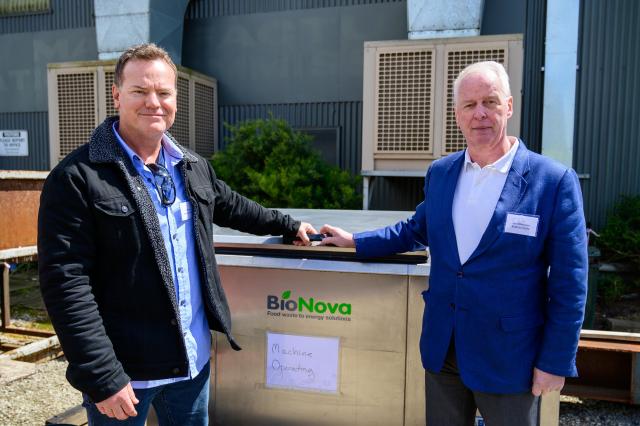
Geelong is the Australian home of a new technology solution to the problem of food and organic waste.
BioNova Pacific held a demonstration at Geelong engineering company Austeng this week to present its new organic waste digester, which uses rapid thermophilic decomposition to reduce the volume of organic waste by 70% in 24 hours.
The BioNova unit produces a rich soil conditioner which is pathogen-free and can be used on gardens and farms, diverting 100% of the waste from landfill and providing a carbon-negative solution.
The inventor of the technology, Mr Lars Ebertsson, presented the new system to representatives from Recycling Victoria, the City of Greater Geelong, Barwon Water and Deakin University BioFactory.
Mr Ebertsson said reducing the amount of organic waste heading to landfill was a critical step in combatting climate change.
“Experts say methane is between seven and 13 times more critical for the environment than carbon dioxide,” he said.
“Australia needs to forget about sending organic waste to landfill. Anything you can do with it apart from landfill is better, everyone agrees on that.”
The BioNova system uses continuous feeding of material, and features a constant population of microbes that help break down organic matter into soil conditioner, which is then automatically discharged from the unit.
“The output is pathogen-free, no salmonella or E. coli or anything like that, as we treat it at 70 degrees,” Mr Ebertsson said.
“It doesn’t create any methane, we have a very small footprint with a high capacity. And the output is then usable to improve soil, also burning with a better energy output than sawdust.”
Mr Ebertsson initially developed the technology in the late 1990s to help address organic waste disposal in Norway, but said the applications as a soil treatment and fertiliser made it perfect for Australian needs.
“There is so much energy in the food waste, and using it for these purposes could be quite a new page in the story,” he said.
The demonstration was done in collaboration with GenU, which provided food waste from their commercial kitchen and green waste from its Landcare program.
The soil conditioner produced in the demonstration will be used to support the activities of GenU’s Landcare program and for product research and development.






